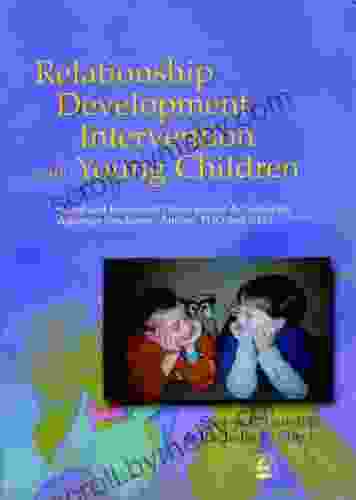Enhancing Young Lives: Relationship Development Intervention for Early Childhood Education

In the realm of early childhood education, fostering strong relationships is paramount for children's optimal development. Relationship Development Intervention (RDI) emerges as a groundbreaking approach that empowers educators and parents to nurture these crucial bonds and unlock the full potential of young learners.
4.5 out of 5
| Language | : | English |
| File size | : | 3559 KB |
| Text-to-Speech | : | Enabled |
| Screen Reader | : | Supported |
| Enhanced typesetting | : | Enabled |
| Word Wise | : | Enabled |
| Print length | : | 334 pages |
Theoretical Foundations of RDI
RDI is grounded in attachment theory, which posits that secure relationships are essential for children's emotional, social, and cognitive development. RDI recognizes that relationships are the foundation for learning and that strong connections between children and their caregivers promote self-regulation, empathy, and a sense of belonging.
Attachment theory emphasizes the importance of sensitive and responsive caregivers who can attune to children's needs, providing a secure base from which they can explore the world. RDI translates these principles into practical strategies that educators and parents can implement in their interactions with young children.
Research-Backed Benefits of RDI
A wealth of research studies have demonstrated the profound benefits of RDI in early childhood education:
- Improved social-emotional skills: Children who participate in RDI programs exhibit enhanced empathy, self-regulation, and social competence.
- Increased language and cognitive development: Strong relationships foster language development, problem-solving skills, and critical thinking.
- Reduced challenging behaviors: RDI helps children develop coping mechanisms and self-calming strategies, reducing the frequency and intensity of challenging behaviors.
- Enhanced academic achievement: Children with strong relationships are more likely to engage in learning, participate in class, and attain academic success.
- Positive long-term outcomes: The benefits of RDI extend beyond the early years, contributing to positive mental health, relationships, and overall well-being throughout a child's life.
Practical Strategies for RDI in the Classroom
Educators can incorporate RDI principles into their daily practices to create a nurturing and responsive environment for young learners:
- Focus on connection: Greet children warmly, make eye contact, and engage in meaningful conversations.
- Be present and attentive: Give children your undivided attention when they are speaking or interacting.
- Respond sensitively: Observe children's cues and respond with empathy and understanding.
- Use positive reinforcement: Praise children's efforts and acknowledge their successes.
- Set clear expectations: Establish age-appropriate boundaries and rules, while providing support and guidance.
- Foster peer interactions: Encourage children to engage in cooperative play and build friendships.
The Role of Parents in RDI
Parents play a vital role in supporting RDI implementation. They can:
- Create a secure home environment: Provide a loving and supportive atmosphere where children feel safe and valued.
- Engage in quality time: Spend meaningful time with children, focusing on connections and shared experiences.
- Practice sensitive responding: Attune to children's needs and respond with empathy and understanding.
- Encourage peer interactions: Provide opportunities for children to socialize and build relationships with their peers.
- Collaborate with educators: Share information about children's development and work together to support RDI implementation.
Relationship Development Intervention is a transformative approach that empowers educators and parents to cultivate strong relationships with young children. By embracing the principles of attachment theory and implementing research-backed strategies, we can create nurturing environments that promote optimal development, social-emotional well-being, and lifelong success for our youngest learners.
This article provides a comprehensive overview of the theoretical foundations, research-backed benefits, and practical strategies of RDI. For further exploration, we recommend delving into the book "Relationship Development Intervention With Young Children" by Stephen Greenspan, Serena Weider, and Bidyut Bose. This invaluable resource offers a comprehensive guide to RDI implementation, empowering professionals and parents to unlock the full potential of young lives.
4.5 out of 5
| Language | : | English |
| File size | : | 3559 KB |
| Text-to-Speech | : | Enabled |
| Screen Reader | : | Supported |
| Enhanced typesetting | : | Enabled |
| Word Wise | : | Enabled |
| Print length | : | 334 pages |
Do you want to contribute by writing guest posts on this blog?
Please contact us and send us a resume of previous articles that you have written.
 Book
Book Novel
Novel Page
Page Chapter
Chapter Text
Text Story
Story Genre
Genre Reader
Reader Library
Library Paperback
Paperback E-book
E-book Magazine
Magazine Newspaper
Newspaper Paragraph
Paragraph Sentence
Sentence Bookmark
Bookmark Shelf
Shelf Glossary
Glossary Bibliography
Bibliography Foreword
Foreword Preface
Preface Synopsis
Synopsis Annotation
Annotation Footnote
Footnote Manuscript
Manuscript Scroll
Scroll Codex
Codex Tome
Tome Bestseller
Bestseller Classics
Classics Library card
Library card Narrative
Narrative Biography
Biography Autobiography
Autobiography Memoir
Memoir Reference
Reference Encyclopedia
Encyclopedia Claudia Rankine
Claudia Rankine M E Thorne
M E Thorne Stephen Goss
Stephen Goss Sally Springer
Sally Springer Clark A Campbell
Clark A Campbell Curtis Darnell Brown Jr
Curtis Darnell Brown Jr Richard Kadrey
Richard Kadrey Remfox
Remfox Cynthia A Robertson
Cynthia A Robertson D G Hart
D G Hart Marko Sarstedt
Marko Sarstedt D B Goodin
D B Goodin Janosch
Janosch Karen Coleman
Karen Coleman Lucy Barnard
Lucy Barnard Complete Test Preparation Inc
Complete Test Preparation Inc Julie Abery
Julie Abery Conrad Goeringer
Conrad Goeringer Colonial Williamsburg Foundation
Colonial Williamsburg Foundation Clemena Antonova
Clemena Antonova
Light bulbAdvertise smarter! Our strategic ad space ensures maximum exposure. Reserve your spot today!
 Sammy PowellFollow ·8.3k
Sammy PowellFollow ·8.3k Rudyard KiplingFollow ·18.2k
Rudyard KiplingFollow ·18.2k Oscar BellFollow ·12.7k
Oscar BellFollow ·12.7k William PowellFollow ·5.3k
William PowellFollow ·5.3k Shannon SimmonsFollow ·17.5k
Shannon SimmonsFollow ·17.5k Kyle PowellFollow ·18.2k
Kyle PowellFollow ·18.2k Harrison BlairFollow ·8.8k
Harrison BlairFollow ·8.8k Thomas PowellFollow ·7.8k
Thomas PowellFollow ·7.8k

 Cruz Simmons
Cruz SimmonsUnveiling the Secrets: An Insider Guide to School Bonds...
Unlock the Power of School...

 Gil Turner
Gil TurnerRuins of Empire: Blood on the Stars - The Epic Space...
Ruins of Empire: Blood on the Stars is the...

 Allen Ginsberg
Allen GinsbergPrepare for the Ultimate Space Opera: Delve into The Last...
Embark on an...

 Anton Foster
Anton FosterUnleash Your Inner Artist: The Ultimate Guide to Oil...
Chapter 1: The...
4.5 out of 5
| Language | : | English |
| File size | : | 3559 KB |
| Text-to-Speech | : | Enabled |
| Screen Reader | : | Supported |
| Enhanced typesetting | : | Enabled |
| Word Wise | : | Enabled |
| Print length | : | 334 pages |
















